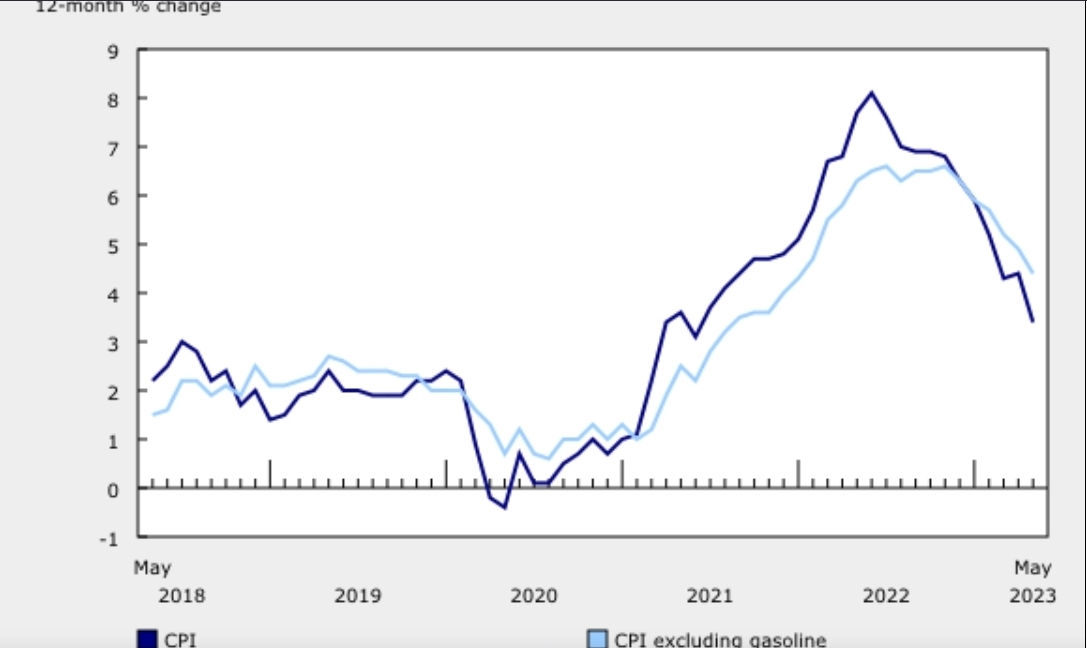I guess it depends on province but I heard you have high inflation over there. How is it affecting the average person over there?
The question is really best answered by asking did the person own real estate before the pandemic hit?
The financial chasm that ripped apart society along the lines of real estate ownership is very real
I’m 100s of thousands behind all my peers who bought before the pandemic now because of this.
It’s likely that I’ll never catch up to them despite having a higher paying career.
It’s not awesome. Lots of belts being tightened.
If you don’t live with someone else (partner or roommates) you’re going to have a bad time unless you make well above the average income for the city you choose.
There are still a few places that are more affordable, but they aren’t particularly desirable locations (Saskatoon for example)
Is that a high crime area?
It’s a medium-size city in the middle of nowhere basically. The land is so flat you can watch your dog run away for three days. It’s not a desirable place so it’s cheap.
you can watch your dog run away for three days.
That made me crack up :D
And then I shared it with my wife, who also cracked up :)
I need to find the perfect occasion to use this.
I’m fortunate that my career went well and I’m a DINK during this and it could be weathered, but it’s a bit rough. In Ontario, rent control was removed and it seemed to lead to the building of a bunch of “luxury” apartments and very little development under that tier which seemed to drive up average pricing even more. The kind of apartment I was paying $1500 for before the pandemic could be $2500 now. Things like meats and cheeses seem to be increasing in price weekly, anywhere from 30-50% more than it was a few months ago.
It didn’t hurt me hard, our household was already putting 50+% into savings given no kids, no car, and very little recreation outside of the apartment; however, I see lots more of my students working through school than I did previously, friends in the lower income range that lived a little outside their means have had to make some pretty big lifestyle cuts to afford rent. Everyone I know living in rent-controlled buildings (in Ontario, those built before 2018 when the regulations changed) are pretty afraid to move and have had contentious relationships with landlords looking to ride inflation to bigger profits.
It’s just a shame it’s happening simultaneously with (or in part because of) the Ontario government working to cut many social services and privatize health care.
You no longer have public health care?
Oh no, we certainly do, but the provincial government is taking steps to try and introduce/bolster a private healthcare market that threatens to reduce access to the public healthcare sector. Lots of cutbacks and legislation has been slowly depleting the publicly funded healthcare in the province, reducing faith in the system, and that’s being used as a means to push a private sector to fix the broken system. It certainly wasn’t perfect before, but it’s pretty transparent what the current provincial government is doing as they have a lot of industry interests.
This is a unified attack too. I live in Alberta, and they are doing the exact same thing here.
The cost of living in Canada is high but so is the standard of living, one of the highest in the world. We pay high taxes but we get a lot of services from the government. Housing is very expensive. Groceries are expensive.
I was born and raised in Canada… and have lived outside of Canada (because of work) for 25 years. I returned to Canada in 2018. My standard of living has dropped significantly. The quality of housing is much worse in Canada. The quality of the food is noticeably lower in Canada.Yes the standard of living is high, but gaaaah… it’s not as great as people think :-(
I’m Australian and lived in the UK for many years (white “western” immigrant bias). But this sentiment, I share it. It’s because most native Canadians only really compare to the USA. Im not at the lower end of the income scale and not as affected (just spend more and it’s better), but holy crap there are better places to be if you are.
Yeah put the USA and Canada side by side and compare things as a typical family with a decent income and 1 or 2 kids and Canada comes out WAY on top. Expand that to Europe for example, and you’re left scratching your head wondering “WTF Canada”.
It’s interesting to see how people live in other parts of the planet… how you can live very comfortably in a very nice home that is half the size of a generic Canadian home. Or how the food quality can be oh so much better elsewhere. When I lived in Africa, the first thing that jumped out at me was the flavour of vegetables… nothing exotic either, just simple things like onions and tomatoes. Unless you’re growing your own in a private garden in Canada, you have NO IDEA what a tomato can actually taste like.
FTA: The unaffordable cities:
1- Richmond Hill, ON 2- Oakville, ON 3- Markham, ON 4- Vaughan, ON 5- Richmond, BC 6- Vancouver, BC 7- Toronto, ON 8- Milton, ON 9- Whitby, ON 10- Coquitlam, BC 11- Burlington, ON 12- Brampton, ON 13- Mississauga, ON 14- Burnaby, BC 15- Ajax, ON 16- Surrey, BC 17- Langley, BC 18- Oshawa, ON 19- Saanich, BC 20- Kelowna, BC 21- Abbotsford, BC 22- Guelph, ON 23- Hamilton, ON 24- Waterloo, ON 25- Cambridge, ON 26- Barrie, ON 27- Kitchener, ON 28- Ottawa, ON 29- London, ON 30- St. Catharines, ON 31- Montreal, QC 32- Windsor, ON 33- Kingston, ON 34- Halifax, NS 35- Greater Sudbury, ON 36- Longueuil, QC
And the affordable cities:
1- Edmonton, AB 2- St. John’s, NL 3- Regina, SK 4- Saguenay, QC 5- Trois-Rivières, QC 6- Quebec City, QC 7- Lévis, QC 8- Winnipeg, MB 9- Saskatoon, SK 10- Gatineau, QC 11- Calgary, AB 12- Sherbrook, QC 13- Terrebonne, QC 14- Laval, QC
I bought in Winnipeg. It’s been working for me. :)
Calgary is considered affordable? Good lord. I can’t even afford proper groceries here anymore
Is meat becoming expensive?
Becoming?? It has been for awhile. Which is ironic because “Alberta beef!!!”
The article uses a definition of affordable being: can the average apartment dwellers afford to save the downpayment for a house. It’s a combination of average incomes, average monthly expenses while renting, and the average house prices. Basically it’s a list of places where one can still dream of being a homeowner without having to have exceptional income or generational wealth.
Calgary swings up and down like the weather. I bought in the fall of 2019, and it was very affordable. Fast forward a few years, and there’s busses coming through my neighbourhood loaded with Ontarians looking to buy. House across the street from me, not nearly as modern as mine, smaller, and without any of the amenities I have (heated garage, central a/c, irrigation), nor a finished basement (which I also have), sold for $250k more than I paid for my house, after a bidding war. I could probably realize a $300k+ gain on my house, after not even quite 4 years. Not like I’m going to act on it though, because the next level is just $300k+ more expensive now too, plus I swore I’m never moving ever again and it hasn’t been long enough yet for me to forget the stress of that.
This will alll change in a few years again. When we moved here at the end of 2012, it was roaring then too, and we were priced out. Real estate prices, like everything else around here, are pretty tied to O&G prices.
18- Oshawa
As a former resident, I can’t imagine the stigma one must feel when getting priced out of that shitty city.
It’s what I’ve never understood about the GTA and its surrounding areas. Like people paying $900k and killing themselves to cover a mortgage that’s 90% of their take home income, to live in like Ajax. No disrespect to Ajax or the 'shwa, but fuck that shit. Same deal with Vancouver too, people doing the same, only to have to commute 1.5 hours to Abbotsford. I got chirped pretty hard last time I was in Vancouver, about how much it must suck to live in Calgary, by someone who lives with their husband and two kids in a one bedroom condo in Surrey. Must be like a ratsnest in there. Call me a hillbilly or a honky, but I feel pretty comfortable knowing I’m backing my car into my 2 1/2 car garage at night, in my 4 bedroom house that I paid probably less for than a one bedroom condo in Surrey with a 1.5 hour commute.
Too close to Toronto.
Inflation hit record highs during the covid pandemic, but its been falling to normal levels again. Inflation numbers are still skewed a bit thanks to food and real estate prices remaining high.
Personally, I haven’t been affected much by inflation. I’d guess that’s mostly because I already bought a house and I eat cheap food. The average Canadian is fine, but young Canadians getting started in life are in a rough spot since they struggle to build up savings.
Here’s a graph by Statistics Canada

The young kids struggling to get started was a problem well before COVID and the inflation. It’s a problem that’s fallout from the elimination of the middle class, and stagnant salary growth compared to an ever rising PPP index. Canada started protecting their (small, super concentrated) elite and the elite’s related corporations, at the cost of the wellbeing of their citizens >1970s. We are seeing a well-established generational difference as a result, that’s now been magnified by the Millenial/Gen Z groups, as they’ve also has to contend with the fallout from huge macroeconomic events like the Great Recession, COVID and post-Covid inflation. Not to mention having to contend with the formation and growth of one of the greatest asset bubbles in modern economic history.
Surviving, wishing I didn’t buy a house Jan. 2022 though lol
Better than buying a house now 😂
Probably would have been the same price or even higher still despite the increase in interest.
You might wanna post in !Canada.
deleted by creator





